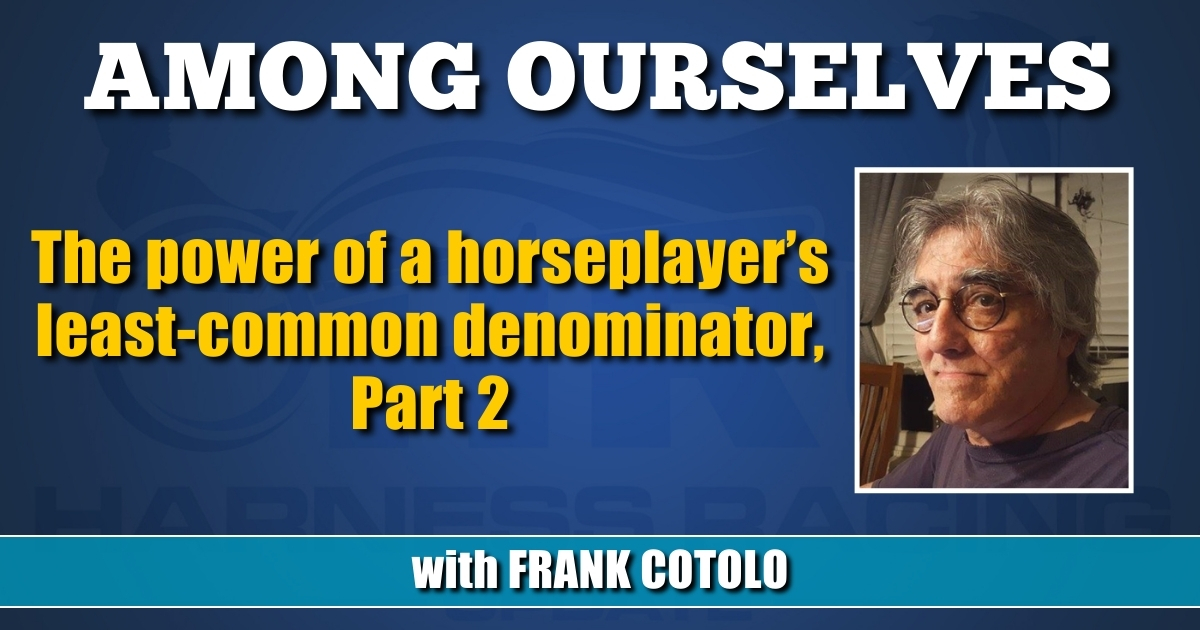The power of a horseplayer’s least-common denominator, Part 2
by Frank Cotolo
I sat alone in Barry Meadows’ box one night at Los Alamitos while he stood indoors in front of a TV monitor with a clipboard and a pen gaging the swift changing exacta prices. I realized the small sitting space in the clubhouse grandstand was the personal spot where he worked “in the field” like a broker amid the fracas of the New York Stock Exchange. I imagined his home office was lousy with books and paper files as well as a computer or two to record trip notes and trainer statistics and financial records along with paraphernalia that adorns such a successful headquarters for one’s business.
My mind wandered and I looked at the personal notes I was keeping that night. There were scribbled lines for half-baked jokes on the borders and some abstract ideas for a short story due soon for publication in “Blue Horse,” a popular small press magazine that did not pay a buck; just a cool amount of literary stature. But not a cent of legal tender. And there were a few notes scratched around the entries of every race offered that evening. One entry had more notes than any other in the program; it was about a horse I intended to bet to win.
Meanwhile Meadows’ brain calculated his next moves for the same race. He focused on only the present; like a Zen master measuring the weight of drama versus knowledge. There was no comparison for our behaviors. Meadows endeavored to make crucial profits and thrive in his business if he participated in the pari-mutuel pools of the upcoming race or dismiss any activity in the next harness contest by interpreting his probabilities for success which were all dictated by a strict financial method of wagering.
The truth of that moment became obvious to me. I was witnessing Meadows’ work habits like a writer and journalist covering the deep processes of his occupation. Our motivation to make a profit was the same but in doing so we were as different as Moses to Ramses.
I cannot recall the name of the horse so let me name it Delaney Lobell. I remember for sure the driver was Tim Maier. My selection of Maier’s horse as the winner was based on past performances all the usual handicapping grist. As I sat watching the toteboard I was encouraged because the betting public was not agreeing with my selection.
Post time neared and Delaney Lobell’s odds were spiking. The win price was close to 10-1 when Meadows got back to the box.
“What do you think about Delaney Lobell,” I said.
“Gotta good chance,” he said, “but his odds are way too high.”
“Too high?”
“Why isn’t he being bet? His chances are far better than 10-1.”
“You mean 12-1,” I said as the next flash of the tote changed all of the odds. “Isn’t it just a big overlay?”
“Too big an overlay. I got him at 4-1.”
I was too confused to make an argument but there was no time for that anyway. Meadows told me he had to realize why the horse was being ignored and he left the box to gather whatever information about the inflated odds would satisfy him before betting. I thought a lot of things. Was he looking for some inside information that may or may not be legitimate? Was he conferring with other big bettors about his opinion of the odds?
I decided I would bet Maier’s horse to win but for some reason I also called bets on Delaney Lobell to place and to show. All in all, I spread strong support for the horse across the board; it was a tactic I was taught years back as a measure of insurance for the ifs and maybes about cashing a ticket to make up for a loss in the win pool when a horse finishes in the place or show spots.
When I returned to the box the field was lining up and Meadows was still absent. Delaney Lobell was having an easy trip with cover for two turns and then heading for the third turn Maier found a spot with plenty of horse left to go first over and command the field to finish behind him, at 13-1.
Still no Meadows. I reveled at the prices I collected across the board and sat down on the hard metal box seat anticipating a joyous shared experience with Meadows. But when he returned, he was dour and in no mood to be comical.
“What’s the matter?” I said.
“I didn’t bet him,” he said. Then he put his clipboard down and walked away.
There is never anything one gambler can say to another in that situation without expecting a punch in the face.
I sat alone in his box for the rest of the evening.

















